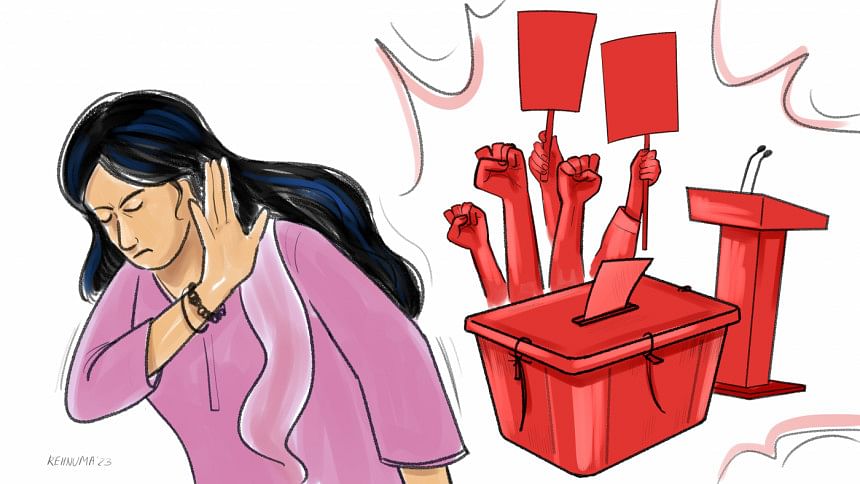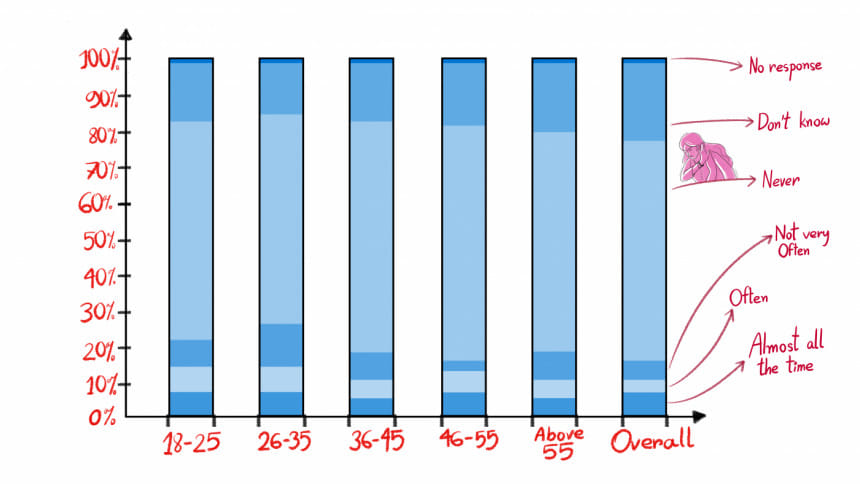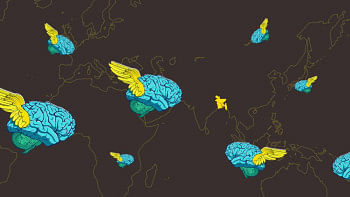Is the youth losing interest in political participation online?

On July 29, 2018, Bangladesh saw the beginning of one of the most successful protests in the country's recent history. A remarkable youth-led movement – triggered by a minister's belittlement of the death of two students – was mobilised on Facebook before it took to the streets. The students' Road Safety Movement is seen as a prime example of youth mobilisation using social media in Bangladesh.
While the protest invoked high hopes for the Bangladeshi youth to turn out as an aware and vigilant generation that cares about the political and social issues in the country, sceptics still view our youth as a group mostly distracted by online entertainment and disinterested in issues of political significance.
A recent report by The Asia Foundation (TAF) and BRAC Institute of Governance and Development (BIGD), titled "The State of Bangladesh's Political Governance, Development and Society: According to Its Citizens," found young people aged 18-25 years to be the most active on social media, particularly on Facebook. The second-most active group was aged 26-35 years. Many studies have found positive links between social media use and young adults' political participation, both online and offline. In contrast, surveys worldwide increasingly show growing percentages of youth being disillusioned with democratic engagement.
Are young adults in Bangladesh interested in political affairs? And if they are online so much, do they find political engagement on social media to be safe and useful?
To answer these questions, we went back to the nationwide survey of over 10,000 respondents conducted by TAF and BIGD between November 2022 and January 2023. Our first point of inquiry was: what do people mostly use Facebook for? The two most common answers were: 1) to get national news (64 percent); and 2) for entertainment purposes (49 percent).
We disaggregated this data by five age groups of respondents, namely the 18-25, 26-35, 36-45, 46-55, and 55+ age groups. We found that the reasons for using Facebook are mostly the same across the age groups. However, 61 percent of the 18-25 group used Facebook for national news, the lowest among all age groups, and 53 percent for entertainment purposes, the highest among all age groups.

The youth, more than their older counterparts, trusts the news they see on Facebook. Among all respondents who said they were exposed to news on Facebook, 52 percent of respondents aged 18-25 years said they trusted it "often" and "almost all the time," both responses combined. In contrast, respondents in the 46-55 and 55+ age brackets responded with lower levels of trust – at 41 percent and 34 percent, respectively.
These findings indicate not only a higher exposure to current affairs through Facebook among the youth, but also their higher level of trust in the credibility of the information they receive. However, most respondents were not very hopeful about the utility of political engagement on Facebook. When asked if they perceived Facebook as a useful tool for ensuring accountability from the state, only 27 percent of all respondents agreed that accountability could be ensured through Facebook "often" and "almost all the time." Similarly, 29 percent of users agreed that citizens can ensure responsiveness of the state through Facebook.
Despite the dismal perception of the majority, the youth seemed relatively optimistic. From the 18-25 age group, 25 percent and 31 percent thought they could ensure accountability and responsiveness of the state, respectively, through Facebook – the highest percentages among all age groups in response to both questions. In contrast, 17 percent and 22 percent of the respondents aged over 55 years believed that Facebook could ensure accountability and responsiveness of the state, respectively.
The youth also found the online platform more useful for monitoring the state, but did not feel comfortable engaging in it. When asked if they felt safe posting about political issues, they were the most sceptical of all age groups, as 78 percent of respondents aged 18-25 years expressed that they felt unsafe expressing opinions regarding political issues on Facebook. Meanwhile, 73 percent of all respondents felt that voicing political opinions on Facebook was unsafe.
When asked about their comfort in voicing social issues, 63 percent of all respondents said they felt unsafe. The same opinion was voiced by 62 percent of the respondents aged 18-25 years.
The above findings indicate that Bangladeshis are largely doubtful of Facebook being a safe platform for political engagement with the state. This puts the youth at a juxtaposition, having relatively higher faith in Facebook's ability to impact the democratic sphere, yet feeling unsafe to engage in it themselves. So, is the youth interested in political engagement in the first place?
To note, 77 percent of the respondents revealed that they rarely discussed political affairs with friends. Disaggregated by age, this accounted for 80 percent of both the 18-25 and the 26-35 age groups – the highest among all groups.
This apathy is also reflected in their basic knowledge of elections and political representatives. When asked when the next national election would be held, only 39 percent of all respondents gave the correct answer, seven percent were wrong, and 54 percent said they did not know. The 26-35 age group had the lowest percentage of correct answers at 39 percent. When the respondents were asked to name the members of parliament (MP) in their constituencies, 71 percent of all respondents were able to answer correctly, whereas the 18-25 age group had the lowest percentage of correct answers at 70 percent.
The survey results reflect people's growing apprehension of online political engagement. Citizens don't feel safe to engage in political discourse on social media, nor do they believe that they can ensure positive outcomes from the state by doing so. Particularly, younger citizens are increasingly feeling disinterested and apathetic towards the country's politics and democratic governance. Is this due to an increasingly hostile political environment? Or is it because of the "distraction" brought on by digital entertainment platforms? This issue needs immediate attention if we are to ensure the practice and preservation of our country's democratic values.
Rafsanul Hoque is senior research associate at BRAC Institute of Governance and Development (BIGD).
Sumaiya Tasnim is research associate at BIGD.
Views expressed in this article are the author's own.
Follow The Daily Star Opinion on Facebook for the latest opinions, commentaries and analyses by experts and professionals. To contribute your article or letter to The Daily Star Opinion, see our guidelines for submission.

 For all latest news, follow The Daily Star's Google News channel.
For all latest news, follow The Daily Star's Google News channel. 











Comments